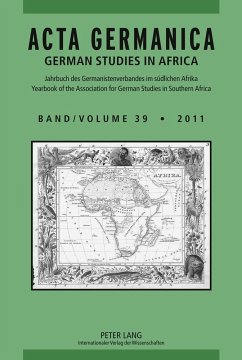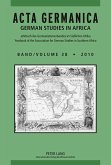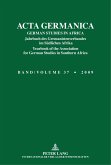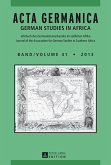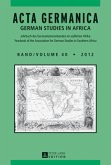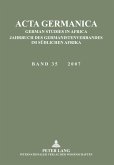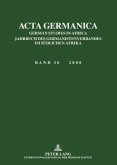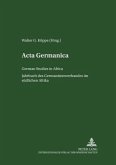Durch die Zusammenarbeit von zwei Verlagen hat die Acta Germanica mit diesem Band zum ersten Mal eine südafrikanische und eine deutsche Ausgabe. Mit dieser erfreulichen Neuerung wird der Schwerpunktsetzung der Zeitschrift des Germanistenverbandes im südlichen Afrika Rechnung getragen, denn zum einen reflektiert sie unsere wissenschaftliche Arbeit im afrikanischen Kontext und zum anderen zeigt sie durch eine erhebliche Anzahl internationaler Beiträge die wachsende globale Verflechtung unseres Faches. Der erste Teil des Bandes versammelt Beiträge, die unterschiedliche Bezüge zu Afrika herstellen, etwa in einer vergleichenden Untersuchung von Tabus und Tabubrüchen in deutschen und afrikanischen Märchen, in der Lesart des Romans Auf dem Strom über die Magie der Symbole, in der Kritik eines kolonialen Utilitarismus gegenüber Frauen in Kafkas Romanfragment Das Schloß sowie der Rolle von Migrationsliteratur in der Vermittlung von interkulturellen Kompetenzen im DaF-Unterricht in Westafrika. Der zweite Teil präsentiert allgemeine Beiträge über Motive der Großstadt in der Migrationsliteratur, eine Untersuchung über mythische Strukturen in Ilija Trojanows Der Weltensammler sowie vier Beiträge über den Zusammenhang von Magie und Sprache in Bezug auf Reden und Schweigen in der deutschen Erinnerungsliteratur, Sebalds Sprache, das Performative der Sprache und historisches Trauma am Beispiel von Herta Müllers Atemschaukel und schließlich in Bezug auf magische Ansprüche in erzählender Literatur. Der letzte Beitrag beleuchtet die aktuelle Rolle der Geisteswissenschaften heute.
Thanks to the co-operation of two publishers, Acta Germanica can now appear in a South African as well as a German edition. This edition is the first to appear under the auspices of this new co-publishing venture. The initiative reflects our scholarly work located within the context of the African continent. But the growing number of international contributions also indicates the increasing global connectedness of our discipline. The first part of this edition comprises four contributions with different takes on African themes, investigating taboos and breaches of taboos from comparative perspectives of German and African fairy tales. Other contributions explore the magic of symbols (in the novel Auf dem Strom ), the critique of colonial utilitarianism in relation to women (in Kafka's novel fragment Das Schloß ), and the role the literature of migration in developing interculturally communicative competencies in German language teaching in West Africa. The second part presents contributions of a more general nature, on motifs of the metropolis in the literature of migration, and on mythical structures in Ilija Trojanow's novel Der Weltensammler . Other contributions in this second part explore the interrelation between magic and language with reference to the structures of speech and silence in German Erinnerungsliteratur, to Sebald's language, to performativity and historical trauma in Herta Müller's novel Atemschaukel , and to narrative prose texts' claims on magic. The last contribution addresses the role of the humanities today.
Thanks to the co-operation of two publishers, Acta Germanica can now appear in a South African as well as a German edition. This edition is the first to appear under the auspices of this new co-publishing venture. The initiative reflects our scholarly work located within the context of the African continent. But the growing number of international contributions also indicates the increasing global connectedness of our discipline. The first part of this edition comprises four contributions with different takes on African themes, investigating taboos and breaches of taboos from comparative perspectives of German and African fairy tales. Other contributions explore the magic of symbols (in the novel Auf dem Strom ), the critique of colonial utilitarianism in relation to women (in Kafka's novel fragment Das Schloß ), and the role the literature of migration in developing interculturally communicative competencies in German language teaching in West Africa. The second part presents contributions of a more general nature, on motifs of the metropolis in the literature of migration, and on mythical structures in Ilija Trojanow's novel Der Weltensammler . Other contributions in this second part explore the interrelation between magic and language with reference to the structures of speech and silence in German Erinnerungsliteratur, to Sebald's language, to performativity and historical trauma in Herta Müller's novel Atemschaukel , and to narrative prose texts' claims on magic. The last contribution addresses the role of the humanities today.

